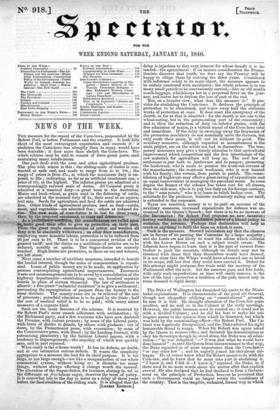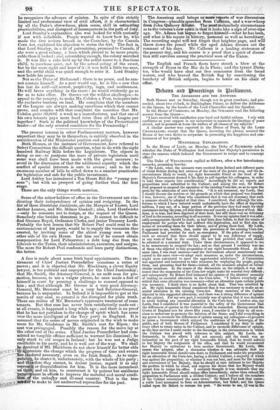The Duke of Wellington has furnished his quota to the
Minis- terial explanations. It is characteristic of the good old General, though not altogether edifying on " constitutional " grounds. In sum it is this. He thought alteration of the Corn-law 9uite needless, and he said so in the Cabinet at the early meetings. However, the public business must be carried on; it could not be with a divided Cabinet ; and he did his best to make his col- leagues assent to the opinion from which he dissented, but which was held by the commanding-officer—Sir Robert Peel. The Ca- binet was hopelessly disorganized, and the Duke advised his right honourable friend to resign. When Sir Robert was again asked by the Queen to resume office, and declared his determination to obey his Sovereign though he stood alone, the Duke was all admi- ration—" he was delighted "—" it was just what he would have done himself" : to save the Queen from inconvenience in that way, the Duke regarded as of more importance than the Corn-law- " or any other law " ; and he eagerly joined his chivalrous col- league. He of course knew what Sir Robert meant to do with the Corn-law, and he knew that he must take part in abolishing it. "I knew it and I did it—I knew it," repeated the Duke, as if there need be no more words about the matter after that explicit avowal. He also declared that he had declined to form a Govern- ment on the principle of Protection, because he perceived that such a Government could no longer retain the confidence of the country. That is the tangible technical, formal way in which
he recognizes the advance of opinion. In spite of this strictly limited and professional view of civil affairis, it is characterized by all the Duke's shrewdness, plain sense, skill in estimating practicabilities, and disregard of consequences in the path of duty.
Lord Stanley's explanation also was looked for with curiosity if not with solicitude. People wanted to know how he, who made the first serious breach in the Corn-law, by the Canada Corn Act, explained his objection to storm the fort. The fact is, that Lord Stanley, in a fit of patronizing, promised to Canada, if she were a good colony, a boon which proved to be more practi- cable than it looked ; and, astonishing enough, the colony snatched it. It was like a cake held up by the artful nurse to a fractious -child, to purchase quiet, not by the actual eating of the sweet, but by the mere sight and hope of it : it was held a little too near, and the artful child was quick enough to seize it. Lord Stanley now holds his peace. Not so the Duke of Richmond : there is no peace, and he can- not contain himself. As a poet would say, he is like a cow that has lost its calf—all sorrow, perplexity, rage, and restlessness. He will brave anythinv_o- in the cause : he would evidently go so far as to take office. He throws out the wildest challenges—to appeal to the country, to make Mr. Cobden a Peer, to inquire into the exclusive burdens on land. He complains that the members of the League are always making assertions which they cannot prove, and couples with that complaint the assertion that Mr. Cobden gains 30,0001. a week as a manufacturer, and that one of 'his own tenants pays more local rates than all the League put
• together I Such is the political knowledge of the Protectionist leader—of the only avowed candidate for the Premiership !



























 Previous page
Previous page